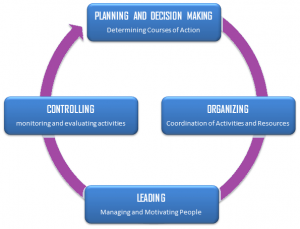Heads up on the four basic functions of management
Heads up on the four basic functions of management
Want to learn more about the business management process? Enrol now on one of BOTI’s business management courses and short courses or management courses that cater for all levels of management. BOTI offers business training programmes across South Africa. Book now!
Management is a systematic way of doing things
When introducing the four basic functions of management keep in mind that the management process is a systematic way of doing things.
All managers, irrespective of their aptitude or level of skill, engage in certain inter-related functions in order to achieve their desired goals.
All managers carry out the main functions of management; planning, organizing, staffing, leading and controlling. But depending on the skills and position on an organizational level, the time and labour spent on each function will differ.
In a nutshell the four basic management functions involve:
- Planning and Decision Making – determining courses of action
- Organizing – Co-ordination of activities and resources
- Leading – Managing and motivating people
- Controlling – Monitoring and evaluating activities
The diagram below illustrates the inter-related functions of the management process.
Want to learn more about the business management process? Enrol now on one of BOTI’s business management courses and short courses or management courses that cater for all levels of management. BOTI offers business training programmes across South Africa. Book now!
Planning and Decision Making – Determining Courses of Action
The planning and decision making function involves looking ahead into the future and predicting possible trends or occurrences which are likely to influence the working situation is possibly one of the most critical skills a manager can possess.
Planning means setting goals
Planning means setting the goals of the organization and deciding how best to go about achieving these goals. Planning involves decision making around the goals to be set and the future course of action to be taken from a given set of alternatives so as to effectively reach these goals.
Planning ensures management effectiveness
The planning phase ensures management effectiveness since it serves to guide the future activities of the business. Essentially, the important elements include selecting appropriate goals and the paths to be taken to effectively achieve these goals.
For a manager, planning and decision-making require an ability to foresee, to visualize, and to look ahead purposefully.
Want to learn more about the business management process? Enrol now on one of BOTI’s business management courses and short courses or management courses that cater for all levels of management. BOTI offers business training programmes across South Africa. Book now!
Organizing – Co-ordinating Activities and Resources
Organizing can be defined as the process by which the established plans are moved closer to being realised.
Once a manager has set goals and developed appropriate plans as a means to achieve them the next managerial task involves organizing human and other resources that are identified as necessary by the plan to reach the said goals and objectives.
Organizing involves determining how activities and resources are to be assembled and coordinated
Organizing produces a structure of relationships in an organization and it is through these structured relationships that future plans are pursued.
Organizing, then, is that part of managing which involves establishing an intentional structure of roles for people to fill in the organization.
It is intentional in the sense of making sure that all the tasks necessary to accomplish goals are assigned to people who are best suited to achieving these tasks. The purpose of an organization structure is to create an environment for optimal human performance.
Want to learn more about the business management process? Enrol now on one of BOTI’s business management courses and short courses or management courses that cater for all levels of management. BOTI offers business training programmes across South Africa. Book now!
Structure
The structure should define the tasks to be completed. The rules as established must also be designed in the light of the abilities and motivations of the people available.
Staffing is related to organizing and it involves filling and keeping filled, the positions in the organization structure.
This can be achieved by determining the positions to be filled, identifying the requirement of manpower, filling the vacancies and training employees so that the assigned tasks are accomplished effectively and efficiently.
The managerial functions of promotion, demotion, discharge, dismissal, transfer, and so forth are also included within the broad task of “staffing.” Staffing ensures the placement of the right person in the right position.
Organizing involves deciding where decisions will be made, who will do what jobs and tasks, who will work for whom, and how resources will be assembled.
Want to learn more about the business management process? Enrol now on one of BOTI’s business management courses and short courses or management courses that cater for all levels of management. BOTI offers business training programmes across South Africa. Book now!
Leading – Managing and Motivating People
The third essential managerial function is leading. The skills attributed to influencing people for a particular purpose or reason are aptly termed as ‘leading’. Leading is considered to be the most important and challenging of all managerial activities.
Leading is influencing or prompting members of an organization to work together with the interests of the organization at the core of activities.
Creating a positive attitude
Creating a positive attitude towards the work and goals to be achieved among the members of the organization also falls within the scope of the function of ‘leading’, it is an essential requirement as it helps to instil the objective of effectiveness and efficiency by changing the behavior of employees to meet the business objectives of the organisation.
The functions of direction, motivation, communication, and coordination are considered as part of the leading process or system.
Want to learn more about the business management process? Enrol now on one of BOTI’s business management courses and short courses or management courses that cater for all levels of management. BOTI offers business training programmes across South Africa. Book now!
The importance of co-ordinating
Coordinating is also essential with respect to the task of leading. Co-ordinating is regarded as the essence of good management for achieving harmony among individual efforts in pursuit of the accomplishment of designated group targets.
Motivating is an essential quality of good leadership. Motivating is the function of the management process that deals with influencing people’s behavior based on the knowledge of what causes and channels sustain human behavior in a particularly committed direction. Efficient managers need to be effective leaders.
Since leadership implies fellowship and people tend to follow those who offer a means of satisfying their own needs, hopes and aspirations it is understandable that leading involves motivation leadership styles and approaches as well as good communication skills.
Controlling – Monitoring and Evaluating Activities
Monitoring the organizational progress toward goal fulfillment is the management function known as ‘controlling’. Monitoring progress is essential to ensuring the achievement of organizational goals.
Controlling involves measuring, comparing, finding deviation and correcting the organizational activities which are performed in respect of achieving the goals or objectives of the organisation.
Want to learn more about the business management process? Enrol now on one of BOTI’s business management courses and short courses or management courses that cater for all levels of management. BOTI offers business training programmes across South Africa. Book now!
Control activities generally related to the measurement of achievement of results
Controlling consists of activities such as measuring performance, comparing with the existing standard and finding the deviations, and correcting the deviations. Control activities generally relate to the measurement of achievement or results of actions which were taken to attain the goals in question.
Certain means of controlling, such as the budget for expenses, inspection records, and the record of labour hours lost, are generally familiar. Each measure also shows whether plans are working out or whether they need to be revised.
Deviations
If deviations persist, correction is indicated. Whenever results are found to differ from the planned action, the individuals responsible are identified and necessary actions are taken to improve performance.
Thus, outcomes are controlled by controlling what people do. Controlling is the last but not the least important management function process.
It is rightly said, “planning without controlling is useless”. In short, we can say that controlling enables the accomplishment of the plan.
All management functions are inter-related and cannot be skipped. The management process designs and maintains an environment in which people working together in groups, accomplish efficiently selected aims and objectives.
You might also like: Essentials of Business Management Course
How to Create and Implement a Business Plan
Could a business run without IT management?
Want to learn more about the business management process? Enrol now on one of BOTI’s business management courses and short courses or management courses that cater for all levels of management. BOTI offers business training programmes across South Africa. Book now!


